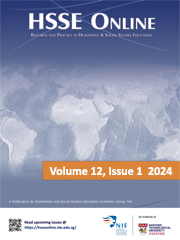Guest Editorial
One of the focal issues in the secondary Social Studies (SS) syllabus in Singapore is diversity and identity in the context of globalisation. Specifically, immigration is highlighted as a major contributor to Singapore’s present diversities, and students of SS are expected to appreciate the causes and consequences of immigration, as well as the trade-offs involved. Within the school walls, Singapore’s student populations are also becoming more diverse than before, with more youth hailing from immigrant households, local-foreign marriages, and mixed-race marriage backgrounds, even though these diversities may not always be obvious on the surface.
Given these realities, it is imperative that both SS students and educators are more informed about how immigrant diversities intersect with education. This special issue of the HSSE Online seeks to make a modest contribution to this agenda. In this issue, we put the spotlight on immigrant families in Singapore, covering interconnecting themes such as home, identity formation, socio-cultural integration and education. This collection of five papers (including three “research articles” and two “findings reports”) examines how immigrant families negotiate their place in Singapore, highlighting the challenges they face and the strategies they employ to adapt to their new socio-cultural environment.
The first research article by XinTong Chen provides an interesting exploration of young mainland Chinese student migrants in Singapore, examining how their childhood education migration experiences have influenced their perceptions of home. Chen argues that young student migrants’ complex transnational networks have reshaped the geographies of their home, making it increasingly mobile and relational. However, she challenges the prevailing literature that suggests transmigrants’ home can be created anywhere, emphasising the continued significance of physical place in shaping migrants’ sense of home. Importantly, Chen’s article foregrounds children’s voices in the adult-centric migration literature, recognising their active agency in navigating transnational lives.
The remaining four papers of the issue stem from a Ministry of Education (MOE)-funded research study on immigrant parenting in Singapore (OER 09/20 YPD), led by Dr Peidong Yang. Four NTU undergraduate students (Britney Ong, Tammy Eng, Ariel Chua, and Kitty Loh) worked on Dr Yang’s project data under the university’s Undergraduate Research Experience on Campus (URECA) scheme. These four young researchers were given the necessary research training (such as coding qualitative data; thematic analysis; research writing) before they were granted access to the qualitative interview data of the project. They were mostly free to scope their analysis, and the ensuing four papers reflect their respective analytical perspectives. As all four student-researchers worked under the close supervision of Dr Yang and his research associate Lee Tat Chow, the latter two are listed as co-authors of all four papers.
The research article by Ong, Chow and Yang looks at immigrant parents’ perspectives on Singapore’s mother-tongue language (MTL) education. Among other things, the paper emphasises the importance of MTL education in maintaining cultural ties and fostering social integration, while also highlighting the unique challenges immigrant parents face in ensuring their children’s proficiency in MTL. The research paper by Eng, Chow, and Yang examines the challenges faced by immigrant parents in navigating and shaping their children’s education in Singapore. Besides unpacking some key challenges faced by immigrant parents, the paper also reveals the resourcefulness of immigrant parents and the strategies they employ to navigate and mitigate these difficulties.
The next two papers in the issue are characterised as “findings report” due to their primarily empirical nature. (Engagement with scholarly literature is not an objective here.) The paper by Chua, Chow and Yang reports preliminary and partial findings on immigrant parents’ discourses surrounding various forms of schooling or education systems. It demonstrates how such discourses inform and are intertwined with the immigrant parents’ articulations of their parenting ideologies and educational philosophies. The paper by Loh, Chow, and Yang explores how immigrant parents influence the development of their children’s identities in Singapore, particularly concerning the delicate balance between maintaining ethnic traditions and integrating into Singapore society. It is found that immigrant parents play an active role in transmitting heritage cultural values and practices to their children, with a focus on maintaining a connection to their heritage while also promoting societal integration into the host country.
Taken together, this issue brings to the fore the lived experiences of immigrant families in Singapore. The featured papers enrich our understanding of how these families – parents and children alike – navigate Singapore’s socio-cultural and educational landscape, while also highlighting their agency in devising strategies to cope with the challenges that arise from their migration status. It is hoped that these papers will offer useful empirical materials and insights in aiding students and teachers of Social Studies to better appreciate the intersections of migration, education, diversity, and identity.
Peidong Yang, XinTong Chen
Singapore
October 2024
Download the entire issue

